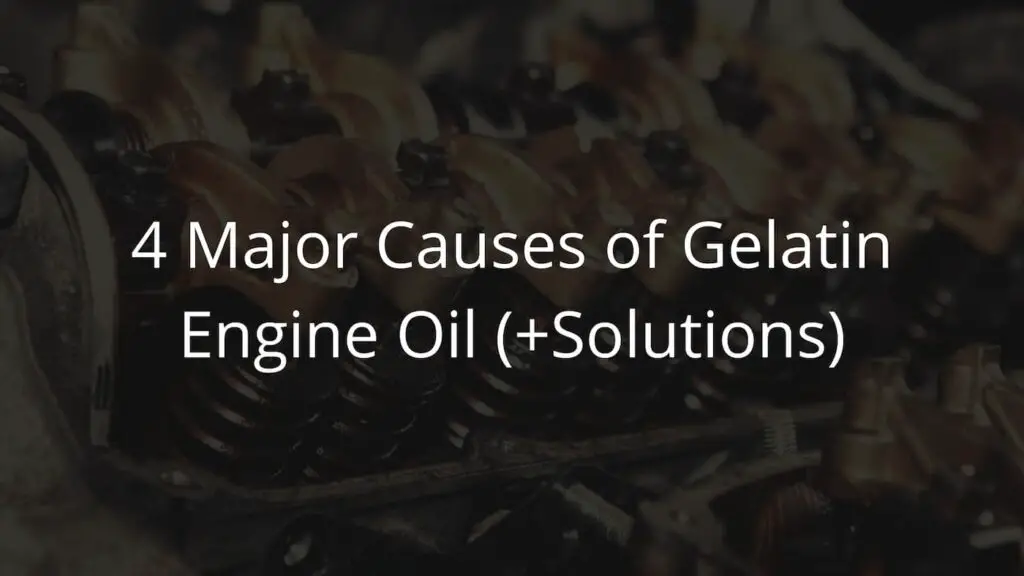Several owners of Chevy Cruze have found jelly-like engine oil in their cars. While it’s not the case with every Cruze, it can get messy.
Not to mention, gelatin engine oil (what jelly-like engine oil is called) can damage your vehicle. Engine oil is supposed to lubricate your vehicle’s engine. A jelly won’t do that.
Here’s the good news: you can still repair your vehicle by removing the gelatin engine oil and fixing whatever caused it.
Read on to learn more about what causes gelatin engine oil and how to fix it.
Here’s what we’ll cover:
What Does Gelatin Engine Oil Look Like?
As the name gives away, gelatin engine oil has a jelly-like appearance and texture. Similar to jelly, the oil becomes thick and moves slowly.
You would typically find this issue in high compression engines — mostly ones that use diesel as fuel.
Let’s explore the probable reasons below:
Gelatin Engine Oil — Possible Causes
Your vehicle’s engine oil can turn into gelatin due to three reasons.
Low Operating Temperatures
One of the most common reasons is the low engine running temperatures, which thickens the oil and forms clumps.
If this happens, you may face several problems, including low engine performance or failure in the worst cases.
Cavitation
Cavitation also turns engine oil into a jelly-like material.
Wondering what’s cavitation?
Cavitation refers to the formation of bubbles (or air pockets) inside a liquid or solid.
Cavitation is deadly for the engine. With time, the bubbles grow and collapse, which creates a shock wave. That shock wave damages your vehicle’s oil film and separates the oil from its additives.
Water Mixed with Oil
Water and engine oil flow side by side in your car. A leak in the cooling system can allow water to mix with the engine oil.
Such leaking issues need urgent attention.
The mixture of water and engine oil often turns into jelly and fails to lubricate the engine components properly. This can lead to premature wear and even failure of the engine.
Contamination
If moisture or debris contaminates oil, it can start to thicken up, turn into jelly, and become unusable.
Contamination is a common problem in older engines. It seeps through and wears out your engine over time.
Fixing the Issue of Engine Oil Gelling
Let’s see how to fix gelatin engine oil.
- Replacing oil: Gelatin engine oil can be prevented by using the recommended engine oil. If you think your vehicle has high-quality engine oil, consider switching to another brand and make sure to avoid substandard engine oil brands.
- Clean the engine: Take your vehicle for a car wash. Your vehicle’s engine requires rigorous cleaning to get rid of contaminants surrounding the engine head.
- Changing the oil filter: The oil filter is a critical component that accumulates all the dirt and debris. Try replacing it if the filter clogs up.
How to Prevent Engine Oil from Turning Gelatinous?
Prevention is better than cure. We suggest you follow these tips to prevent gelatin oil formation.
- Change engine oil at regular intervals.
- Use high-quality, synthetic motor oil, especially for cold weather operations.
- Check your vehicle’s oil level regularly and top it up if necessary.
- Drive your car weekly to avoid problems.
Final Thoughts: What Causes Gelatin Engine Oil: Fixes and Prevention
Multiple vehicles, such as Chevy Cruze, are facing the issue of gelatin engine oil.
Gelatin engine oil damages your vehicle’s engine as it doesn’t lubricate the moving parts. It can lead to increased wear, tear and engine failure.
Have you experienced something similar?
Let us know in the comments.
Explore our blog for more information on engine oils.



